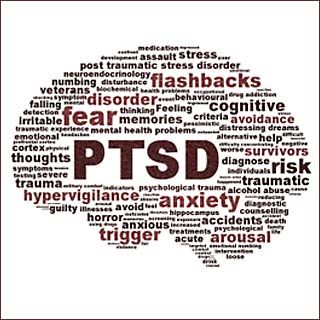
Trauma
Trauma Outpaces Our Ability to Adapt
It is the source of our suffering.
Posted September 17, 2015

Trauma is not some bizarre thing that happens to us and mysteriously sends everything off kilter. It is a violent extension of the routine processes of the brain, and how we write our plays of consciousness through the limbic system. All throughout life, trauma defines the negative element of our environment. Just as responsiveness is the source of healing in the world, trauma is the agent of harm and damage. Trauma consists of abuse — sadism and cruelty — and deprivation — the cold absence of loving which generates the absence of the possibility of tender attachments.
Trauma is an assault so extreme that it overrides and rewrites our established play of consciousness.
It outpaces our flexibility to adapt, and writes a dark new play in its place.
The ways that trauma affects us is consonant with how consciousness is formed in the first place. Consciousness is written as a drama in the theater of the brain. It is written as our temperament digests our environment. Our pertinent emotional environment may be one of loving responsiveness or it may be traumatic — full of sadism, and emotional deprivation. The "play" consists of a representational world with a cast of characters who relate together by feeling, scenarios, as well as plots, set designs, and landscape. Keep in mind that the plays of consciousness are illusions of our brains taken to be real.
Here’s how consciousness writes its plays:
The limbic system, in the context of traumatic abuse, maps our emotional experience as sadistic aggression filled with attack, humiliation, and endless war. Consequently, the activated internal scenario is one of continuous internal fighting between personas. It is mapped through the limbic pathways of serotonin, cortisol, and adrenaline.
In the context of loving responsiveness it would be mapped through gentle oxytocin pathways. The mapping of our nurture reflects our actual experience of parental care. [See – “The Nature-Nurture Question – Nurture”]. Our parental experience is then digested by our genetic temperament. The four elements of temperament are shown in the "nature" post [See - “The Nature-Nurture Question – Nature”.] The more sado-masochistic trauma, the more damage to our plays which prefigure psychiatric symptoms later in life.
Trauma damages us during our formative years in childhood, and affects us for the rest of our lives. Sexual abuse, physical abuse, emotional abuse, extreme violence, and the absence of warmth, tenderness and caring that ought to be a safe harbor for our attachments. Violations such as these, generate extreme forms of damage. Once our character forms, we live out its invisible scenarios for the rest of our lives.
One person subject to sadistic attacks will generate one set of symptoms, while someone else, with a different temperament and similar abuse, will adapt with other symptoms. One person may process trauma in such a way as to generate a state of depression; Someone else may generate anxiety, or obsessions or compulsions, phobias, or hyperactivity. And if the coherence of the play fragments, we may get psychosis or mania. This all comes from the way our temperament adapts to trauma. This is the whole story. The idea of brain diseases, or brain disorders is a complete fiction. There’s no such thing. There certainly are neurological conditions like Tourette’s, but these are easily distinguished from psychiatric struggles.
As the twig is bent so grows the tree. Once our primary play is established, the rest of our experience is filtered through it. Once our original play is in place we continue writing our character. All along the way, in childhood, in adolescence, in adulthood, there can be traumas so significant that they can override and rewrite the original play. When subject to trauma later in life it can send us into much darker places.
In the course of life, traumas affect us more powerfully when we are younger. [This in no way is meant to diminish the post trauma effects of adult trauma such as wars and significant losses.] I’ve had patients who were victims of incest at age four. The play could not encompass such a violation and it fragmented into psychosis. When sexual abuse happens so early, our play foundation is far too weak to handle it. As our plays of consciousness get written over time, they solidify.
In other patients, later violations of sexual abuse did not create schizophrenia. Instead, the patients utilized the extreme adaptions of dissociation and splitting. Sexual molestation generates a sexual response in the victim which is of course unacceptable to the victim. This is compounded by the sadistic attack. By dissociating the patient is able to deny and not feel the sexual response, although it is actually present. The most difficult aspect of therapy is to own and mourn this response which has been put inside the victim, but is not caused by her. While the sexual response is dissociated, she still secretly identifies with it. The secret identity of the victim is that the molestation is her fault, which of course is not at all true. She believes she is bad and shameful. She believes she is the pervert. By splitting, the victim can construct positive fantasies of the perpetrator and develop Stockholm syndrome, even believing that the perpetrator loves and cares about her. This is sadly very common. Most prostitutes, subjects of pornographic movies and pictures, and strippers are sexual abuse victims. And “Johns” take advantage of this travesty for their sexual fantasies and activities.
People’s suffering is a human story. This has been known throughout the wisdom of the ages. The delusion of the twenty-first century is that people suffer from genetic, biochemical brain diseases, an insult to the human condition. Despite the fact that it is so widely believed, it deserves to be disregarded as a bad joke.
We must return psychiatry to its proper place, where it is understood that the only subject of psychiatry is the human story. And that trauma is the major player in all of our psychiatric struggles. I call psychotherapy the "Psychotherapy of Character". It could just as appropriately be called the "Psychotherapy of Trauma".
The living of a life is the story of our character, our history. Etymologically history is derived from: ‘inquire’, ‘to know’, ‘finding out’, ‘a narrative record of past events’, ‘a historical play or drama’, ‘what happened among human beings’. It has been estimated that the number of people who have ever been born is 107,602,707,791. Putting it all together we have over 107 billion unique human narratives. Every snowflake is different, but we are all snowflakes.
Character is destiny. What can help ameliorate the pain of trauma and alter our destinies?
All responses to trauma are actually problematic adaptations. In the formative years it just seems intrinsic, an invisible part of our character. As we get older, trauma can become more dissociated. The treatment for trauma is mourning. Psychotherapy is all about mourning the traumas of our life. A therapist must have his own therapy to attend to the traumatic pain in his own life so it doesn’t interfere with his wherewithal to be responsive as a therapist. A therapist is neither superior nor inferior in relation to his patient. Patients are not "sick". Psychotherapy is the difficult and complicated process of respectful mourning in the context of emotional trust and listening to the story. The major thing that differentiates a therapist is his willingness to sit with pain that most people with any common sense would tend to flee from.
Mourning a loss or a death is the opposite process from mourning post traumatic events. Both are traumas. When a man mourns the death of his wife, the issue is for the husband to relinquish his old deeply held way of life, in which he has a life of attachment to his wife. His marriage play continues to live on in the deeply held limbic mappings of his consciousness. He has to mourn to accept the new play where she is no more. Mourning her death is the process by which the older play of his wife will cease to be his activated play.
When his wife dies, despite the fact that the he knows cognitively that she has died, the process of mourning will allow him to inhabit the new play, that she is gone. Elisabeth Kubler-Ross’s five stages of grief — denial, bargaining, anger, sadness, and acceptance — accurately describe the processes involved in relinquishing the old play to accept and inhabit the new one. [These five stages are just a shorthand, mourning is a far more complicated process than this.] There is an emptiness that always remains, as the pain of loss can never completely heal. At best, by grieving our loss, we can allow it to live on and be enshrined as a loving memory where it belongs. Once an attachment forms it can never be undone. It enters our world as a monument to the living. All loss leaves scars. [See - “Mourning – death, loss, trauma, and psychotherapy. It is the universal agent for recovery and change.”]
With post traumatic events, a powerful and violent new play is written and gains ascendancy over the old plays. The purpose of the mourning process is to digest and relinquish the new play to allow for a more loving one to become re-established or newly written.
When incredible trauma happens in war, the newly written play becomes the operative emotional reality. As a result of the power of the illusions of consciousness, we think we are believing what we see, but in fact we are actually seeing what we believe. The flashbacks, the paranoia, the distorted reality, and the nightmares all reflect the newly written play in our brain. In war, the trauma writes a new play of sadistic violence and loss, which overrides regular life plays. This then becomes the new reality which gets played out and believed over and over again. To recover from post trauma, one must mourn and digest the new trauma to return to the original play. This too is never perfect. In this case the individual must face, digest and mourn the violence, loss, rage, fear, and pain of what happened in an extraordinary situation. This process is extremely difficult. A therapist must be responsive to the hazards. The pain always feels worse before it gets better, and the patient must be safe. Sometimes, the pain is too powerful and can only be approached with great care to not become too overwhelming. A responsive therapist does not have to be a soldier to understand. He has to be open. It is often useful to have others with similar experience together within group settings.
For the sake of brevity, I won’t go into the traumas generated from physical, sexual, and emotional abuse. They operate in a similar way as war trauma. With ongoing violations of abuse, the established plays of consciousness get overridden and rewritten by the limbic system in the brain. The process of mourning is to redigest the experience in such a way as to separate oneself from the sadistic aggression that they're a victim of, always in the context of one’s temperament.
The processes of psychotherapy allow one to dismantle the old abusive play and write a new play in the context of trust and responsiveness to live a life of greater authenticity and the capacity for love.
Robert A. Berezin, MD is the author of “Psychotherapy of Character, the Play of Consciousness in the Theater of the Brain.”



